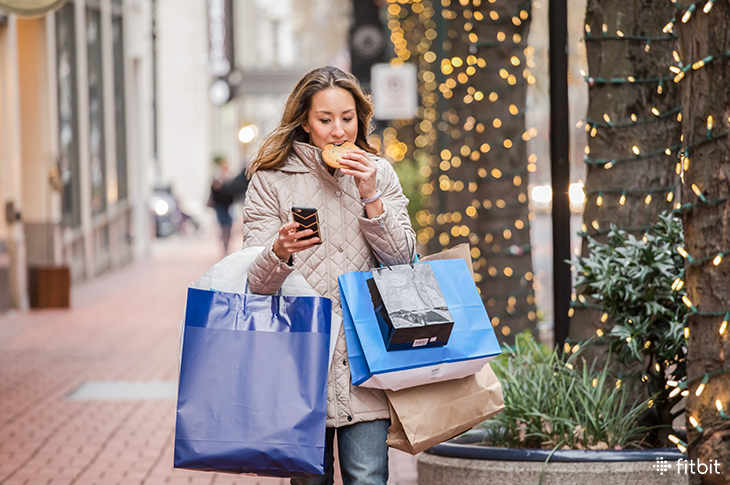
Let’s face it, the most festive time of year can also be the most stressful! You’ve got deadlines at work, family drama at home, and a to-do list the length of your arm. Living in a state of fight or flight can eventually take a toll on your body—making you more prone to heart disease, high blood pressure, depression, and diabetes. Being stressed for even just a few days can affect your body and your behavior, causing you to seek out ways to soothe your inner turmoil: Chocolate and chardonnay may seem like good therapists, but don’t be fooled!
Here are five ways fretting causes fat to creep on, along with stress-busting strategies to help restore your inner calm.
Red Flag #1: You Have an Anxious Appetite
When you feel anxious, your body is flooded with cortisol. This “stress” hormone may have helped you survive a predator in the past, but too much of it in modern times can lead to weight gain. It can switch off insulin production, disrupt your metabolism, mess with the hormones that regulate your appetite—and make you really hungry! When you’re panicking about dinner with your in-laws and have copious holiday treats at your fingertips, it’s a recipe for disaster.
Red Flag #2: You’re Turning to High Calorie Treats
Are you reaching for a giant snowflake-shaped cookie? If only stress made you want to dive into a big bowl of leafy greens! That cortisol surging through your body makes you crave high calorie foods, and when you eat them, the “feel good” hormone dopamine makes you feel better. Unfortunately, sugary and fatty foods don’t make your troubles disappear. They may soothe you for the few seconds, but your worries will remain, now accompanied by guilt.
Red Flag #3: You’re Struggling to Get a Good Night’s Sleep
With so much to organize this time of year, finding the recommended 7 to 9 hours of zzz’s can become a tight squeeze—you work during the day, so you have to shop online at night, right? Plus, cortisol coursing through your veins makes it difficult to fall asleep. 83.6 million adults in the US are already sleep deprived, and this extra seasonal sleep debt isn’t helping your weight. Inadequate sleep disrupts the balance of those same appetite-regulating hormones. Not only do you end up eating more the next day, but your body is less efficient at metabolizing those extra calories.
Red Flag #4: You Have an Expanding Waistline
Stress triggers your body to store fat, especially belly fat. And you have cortisol to thank for that, too. Fat cells, particularly those around your middle, are pretty good at clearing out cortisol. So the more cortisol you have, the more fat cells you need. Plus, abdominal fat cells may cause more cortisol to be produced, creating a vicious cycle and extra pudge under your jeans that can be difficult to budge.
Red Flag #5: You’re Blowing Off Steam With Booze
At the end of a bad day, that first glass of red wine may not even touch sides, tempting you to reach for a second … or third. Alcohol may ease tensions while you’re drinking it, but going overboard contributes to weight gain. Alcohol negatively affects your sleep, makes you more likely to eat more, and store more calories. Plus, a sore head the next day is not going to make it any easier to wrestle your way through the holiday shopping crowds.
Finding time for self care during one of the busiest times of year isn’t easy, but it’s important. Here are a few healthy ways to prevent your anxieties from piling on the pounds.
Better-For-You Stress Busters
Boost your feel-good hormones (in a healthy way): Listen to music you love. Exercise for endorphins. Spend time with a friend who makes you laugh. Bundle up and go for a walk outside, noticing the beauty of nature.
Take time to relax: Allow yourself time to slow down and take deep breaths—even for a couple of minutes each day. Increasing oxygen to your brain helps to calm you down.
Prioritize sleep: Set a bedtime reminder that will allow you to get at least 7 hours of sleep and stick to it! Steer clear of screens for an hour before bed—try curling up with a feel-good novel and a cup of chamomile tea, instead.
Choose food wisely: If it’s too hard to resist the treats in your pantry, avoid buying them. Keep your diet mostly healthy and don’t miss out on mood-boosting nutrients like B vitamins and omega-3’s.
Savor treats mindfully: When you do decide to indulge in a sweet treat or glass of wine, be in control of the situation, rather than letting your emotions control your eating. Savor a small serving slowly, without guilt, and move on to healthier foods the next time you eat.
This information is for educational purposes only and is not intended as a substitute for medical diagnosis or treatment. You should not use this information to diagnose or treat a health problem or condition. Always check with your doctor before changing your diet, altering your sleep habits, taking supplements, or starting a new fitness routine.

Those tips are exactly what I need! I am fighting an overwhelming stress that makes me eat more. I noticed that, I eat more than usual and I am always hungry!
i have the same issue! I am at school and I notice that there are many times in my life where I eat or binge eat without noticing! I majorly need to combat this! one issue I find is when are the best times to eat as I struggle to eat a full breakfast in the morning!